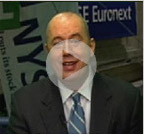(Reuters).- A senior International Monetary Fund official has urged Japan to go ahead with a sales tax hike scheduled for April 2017 to maintain its long-term fiscal credibility.
Mitsuhiro Furusawa, the IMF’s deputy managing director, warned on Sunday that flexible fiscal policy and structural reforms must accompany ultra-loose monetary policy for Japan to achieve a sustained economic recovery.
“If you keep missing your medium- to long-term fiscal target, people will start having doubts” on whether Japan is serious about reining its burgeoning public debt, Furusawa said.
“Delaying the tax hike just because you don’t like it won’t be too convincing,” he told Reuters at the World Bank and International Monetary Fund meetings.
Prime Minister Shinzo Abe delayed a second sales tax hike by 18 months to April 2017, after the first one pushed Japan into a recession last year. He has pledged not to delay it again, but some lawmakers fret that the economy may not have revived enough to weather the pain from the higher levy.
Furusawa said Japan should proceed with the second hike, which will bring the tax rate to 10 percent, unless the economy is hit by an external shock of the scale of the collapse of Lehman Brothers in 2008.
On the yen, the former top Japanese currency diplomat said that while its declines had both advantages and disadvantages for the economy, it was important to avoid extreme fluctuation.
“Some companies may benefit from a weak yen, while others may not. But for companies to have enough time to adjust their business plans, it’s important that the yen doesn’t move too rapidly,” he said.
“Policymakers would need to respond to excessive volatility or disorderly currency moves. Otherwise, currency rates should basically be determined by markets,” he said.
Furusawa declined to comment on whether the Bank of Japan should ease policy further at its next meeting on Oct. 30, when it is set to cut its long-term economic and price forecasts.
But he said that inflation has gradually accelerated when excluding the effect of slumping energy costs.
“There’s not much the BOJ can do about external factors, so it will probably guide policy looking at many other things.”
Japan’s economy shrank in April-June and may suffer another contraction in July-September on weak exports and consumption.
Consumer prices slid in the year to August on slumping energy costs, keeping the BOJ under pressure to expand its massive stimulus to meet its 2 percent inflation target.








